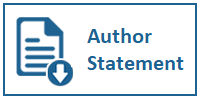ANALISIS HUBUNGAN ENJOYMENT, ENTERTAINMENT, EDUCATION, FLOW DAN DESIGN BACKGROUND DALAM VIRTUAL TOURISM SELAMA COVID-19
DOI:
https://doi.org/10.31937/manajemen.v13i1.1987Abstract
Abstract- COVID-19 has a significant impact for Indonesian tourism industry and MSMEs (Micro, Small, Medium, Entreprises) where are strong leaning on direct interaction. This condition causes has a significant impact on the decline of national tourism economy. It impacts to a contraction of 88.82% in 2020 which increases the risk of loss by IDR 54.6 trillion if it occurs during the year. It is as a result government's policy to keep the distance to break the COVID-19 spread however, tourism well known as an industry where cannot be separated by human touch and visitors direct experience. In this digital development era, virtual tourism becomes the alternative solution to reduce contraction rate implemented by tourism entrepreneur and the Indonesian Ministry of Tourism and Creative Economy. When talking about technology, we will discuss how it is executed in the present and the development of its implementation for the next 10 years. Existing research focuses on the marketing elements of virtual tourism, therefore, it is important to analyse which elements in the virtual tourism experience are able to attract the attention of tourists for continuance using virtual tourism. Researcher implement quantitative methods by distributing questionnaires to 308 respondents to millennial labor force in urban cities. Researchers used TAM (Theory of Acceptance Model) to see the effect of enjoyment, entertainment, education as Perceived Ease of Use (PEOU) and Flow and Design Background as Perceived Usefuless (PU). The results of this study indicates Education, Flow and Design Background elements have direct positive effect on increasing tourist attention using Virtual Tourism. This research is expected to be able to contribute to the development of virtual tourism technology and how it is implemented in Marketing 5.0
Keywords: Virtual Touris;, Continuance Purchase Intention; Percevived Eased of Use; Perceived of Usefulness
Downloads
Downloads
Published
How to Cite
Issue
Section
License
Authors retain copyright and grant the journal right of first publication with the work simultaneously licensed under a Creative Commons Attribution-ShareAlike International License (CC-BY-SA 4.0) that allows others to share the work with an acknowledgement of the work's authorship and initial publication in this journal.
Authors are able to enter into separate, additional contractual arrangements for the non-exclusive distribution of the journal's published version of the work (e.g., post it to an institutional repository or publish it in a book), with an acknowledgement of its initial publication in this journal.















